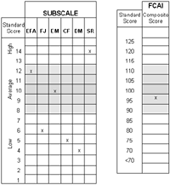
Financial Competence Assessment Inventory
LEARN MORE
Features of the FCAI
The FCAI is an individually administered structured interview. It has been shown to be unbiased relative to gender and age. The six components of the FCAI assess a person’s financial competence through observed performance tasks (e.g., reading a bill) and self-report (e.g., asking the person how he or she plans for expected bills). Composite scores are available for overall financial competence.
The manual includes standard administration instructions and scoring guidelines. FCAI items are scored using a Likert type scale ranging in levels of understanding, from 0 - 4 (where 0 = little or no awareness, 1 = rudimentary awareness, 2 = partial understanding, 3 = adequate understanding, through 4 = complete understanding. The score for each subscale of the FCAI is calculated by summing the particular item scores for that subscale. The total or composite score for the FCAI is calculated by summing the scores across the six subscales (i.e., everyday financial abilities, financial judgment, estate management, cognitive functioning related to financial tasks, debt management, and support resources). Higher scores indicate good understanding of financial skills assessed and lower scores indicate difficulty with financial skills and tasks.
Information regarding compiling individual financial competence profiles and interpretation of test score results are included in the manual. (See example
profiles below).
FCAI profiles for a
person with acquired brain injury

